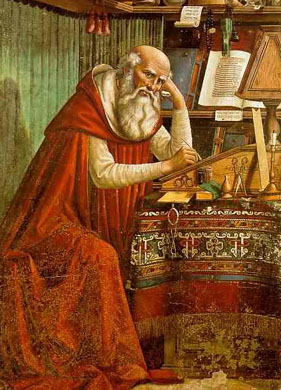
It's the typical American urban story: Keeping up with the Joneses. We believe we are entitled to all that the riches of the world has to offer us, and still we want more-the best car, the biggest house on the cul-de-sac, the most amount of money in our savings, investment portfolios, and cash deposits.
Not that any of these things is bad in and of themselves. Security and well-being are basic needs in life. But the above scenario goes beyond these basic needs. It is actually a disease that affects our relationships on all fronts-personal, family, and community. Avarice kills our souls, and every relationship that is important to us.
St. John Cassian calls this sin a disease of the soul, and thus does not originate in the body. We feel hunger so we feed ourselves. Hunger is natural to the body, and so feeding ourselves is a right and proper response to this bodily need.Gluttony happens when we seek to satisfy our appetite beyond the body's need. We fall in love, and we seek to marry the one who has won our affections, and have conjugal relations with her/him, and as a result of this act of love a child is conceived and brought to into the world. The bodily urge to mate has its end-to bring new life into this world in a covenanted communion of love. Lust happens when we seek to satisfy these urges for their own sakes, and outside of the sacrament of marriage.
But avarice is different. It comes from outside of us, and in one sense, it is easier to ward off than gluttony and lust, which manipulate legitimate needs of the body. On the other hand, it is the hardest to eliminate once it has found a home in our hearts. St. Cassian calls it a passion not deriving from nature, but from the evil use of our free wills. All sins, of course, are consented to by our free wills, but avarice, being outside of the scope of our bodily passions, has to be invited in. Once it has taken residence, it begins its work in making the avaricious soul start to seek value in the amassing greater wealth and power, and greater lordship over others. St. Theodoros the Great Ascetic (9th century?) agrees with this assessment of avarice when he says that "love of praise and love of material wealth must not be regarded as pertaining to the body. Only the love of sensual pleasure pertains to the body. The fitting remedy for this is bodily hardship. Love of praise and love of material wealth are the progeny of ignorance. Having no experience of of true blessings and no knowledge of noetic realities, the soul has adopted such bastard offspring, thinking that riches can supply its needs." (Theoretikon, in Philokalia, vol. 2, p. 46)
We can see now that there is an even deeper issue involved in our first parents' temptation in the Garden than food. It was the lust for power over themselves, independent of God, who had given them their being, that motivated this defiance. And what did this give them? As the Spanish philosopher and social critic once observed, man is in the kind of predicament where he is "lord of all things", but not lord of himself. How ironic. In an attempt to be lord of himself, the avaricious soul has enslaved himself to the amassing of wealth and power, to no end but the satisfaction of his lust for power. Charlie Sheen's character, Bud Fox, in the film Wall Street comes to mind, as he surveys all that he has gained: a spacious Manhattan penthouse, the top position in the stock exchange firm, and a model-like girlfriend. But he is empty. What's all this for?
We find ourselves victims of our own desires, our private hell. This is the futility to which the avaricious are forever consinged to in the fourth circle of hell, the circle of the hoarders and spendthrifts. They are forever condemned to a futile form of competition, which gets them no where, "bump(ing) together, and where they bump, wheel right 'round, and return, trundling their loads again, shouting, 'Why chuck away?' 'Why grab so tight?'" (Inferno, Divine Comedy, p. 111) Both are the result of the disease of avarice.
This is why St. Paul calls avarice (i.e. the "love of money") the root of all evil. Notice that it is not money in and of itself that is the problem. It is the avaricious use of money that is at the root of many of the evils that strain relationships, wars and oppressions. Wealth in and of itself is not the problem. The problem comes when we acquire it in less than honest ways, and use it for our own selfish desires.
St. Cassian gives this dire warning to his monks: remember Annanias and Sapphira, Gehazi, and Judas Iscariot. The love of money caused Annanias and Sapphira to lie to the Apostles, thus bringing about their deaths. The love of money caused Gehazi in 2 Kings 4 to break out in leprosy as a divine judgement for his greed. The worst fate came upon Judas, who for the love of money betrayed his Lord. These are all cautionary tales of what happens to our souls when it is afflicted with the disease of avarice. For St. Cassian, pondering these fates should have a salutary effect on his monks, so that they do not abandon their high calling of ascetic struggle for the fleeting pleasures of wealth and gain. This ascetic struggle is one we are all called upon to engage in, and it begins with guarding our thoughts from the love of gain and wealth, bearing in mind the true and lasting wealth that the deifying grace of God affords us, a wealth that no moth or rust can corrupt, and that no theif can ever steal from us.









